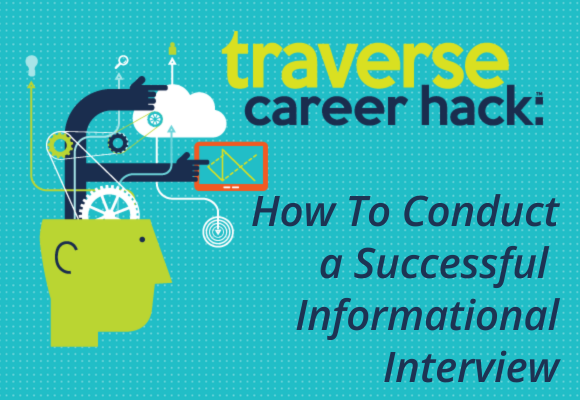
Informational interviews are a key tactic to a successful job search and career transition. They:
- Provide a wealth of information about what it is like to work for a potential employer.
- Are direct paths to the hidden job market.
- Help us expand our networks and improve our networking skills.
How we conduct the informational interview—from the questions we ask, to how actively we listen, to the action we take as a result—is important for making the most of this opportunity.
Instead of: Hoping you do well or deciding to wing your informational interview....
Try: Preparing, using active listening skills, and making decisive next steps.
- Start with someone who is easy to talk to. To practice informational interviewing, identify someone you can easily talk to. This could be a neighbor who works at a company you have always been curious about. It could be a parent on your daughter’s softball team who works in Human Resources. It could be a leader in your community who works in Marketing at a nonprofit. Choosing someone you feel comfortable speaking with also increases the chances they will say “yes” to your request for an informational interview.
- Ask for the interview and provide the reason. A brief email can lock in your interview by making it easy for them to say yes: “Hi David, it was great seeing you at the BBQ! It was so nice that so many neighbors could make it. I would love to ask you more about your career and your role in marketing at (x organization). I am searching for a new position (or, I am making a career transition) and I am really curious about your organization and what you do there as I think about my next career move. Are you available on Tuesday at 12PM?”
- Prepare thoughtful questions. Open-ended questions are a great way to gather important information when conducting your interview. Below are three questions that can help you learn more about your interviewee and the role they play at their organization, and provide you with feedback or advice from the individual:
1. Tell me about what you do in your role as (x)?
2. What is the best part about working for your organization?
3. What feedback or advice do you have for me on how to apply to your organization if I see an opening? - Listen (actively) to the information you are collecting: Your active listening skills will provide you with invaluable data as you listen without interrupting and demonstrate your ability to reflect back what you heard as you conduct your interview. Actively listening to the information being shared also enables you to listen for cues so you delve into an answer further. The best part of active listening is that your interviewee feels heard – and valued. For example, “That is great to hear you feel so aligned with your company’s values and that you have an employee referral program! I am also really excited to hear that your organization does so much community work and has a focus on work/life balance for employees, which are things I am looking for in a potential employer.”
- Take ACTION. Taking action after conducting a successful informational interview is twofold. The first part is formulating a decisive next step with your interviewee. For example: “Could I send you my resume and cover letter to pass along through your employee referral program?” Part two is ENSURING your interviewee knows HOW they helped. For example: “David, I really appreciate your time. I now have a really great understanding of your company culture and what you love about (x organization). The information you provided is very valuable as I look for my next opportunity. Thank you for the offer to send my resume and cover letter through your employee referral system when I see a job opening I am interested in.” Providing this key feedback to your interviewee allows them to feel as good as you do about how you (both) did.
Informational interviews help us make important career decisions with greater clarity, especially when we are job searching or want to move our careers in an entirely different direction. Preparing well for an informational interview, employing active listening skills, and sharing feedback with your interviewee on how they helped are key to taking a decisive next step, which just might be identifying who you will interview – next!

